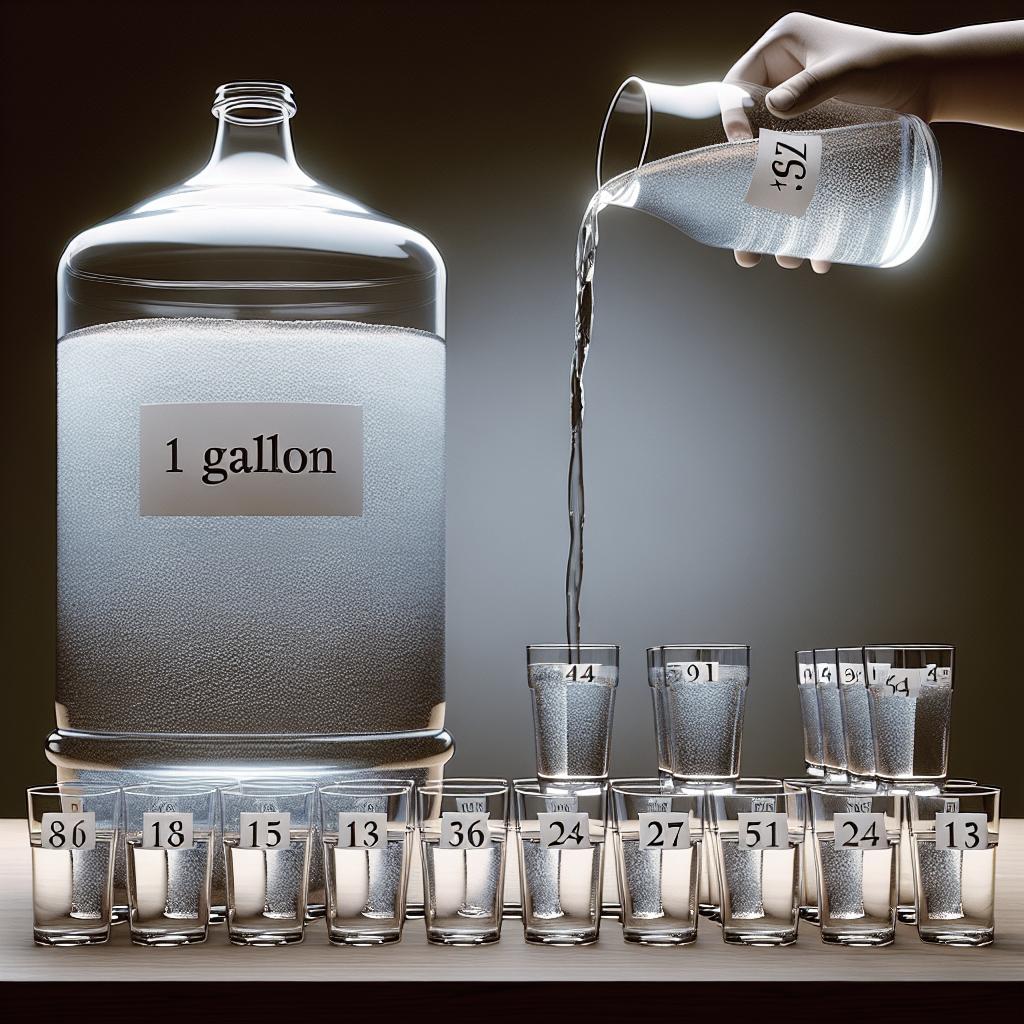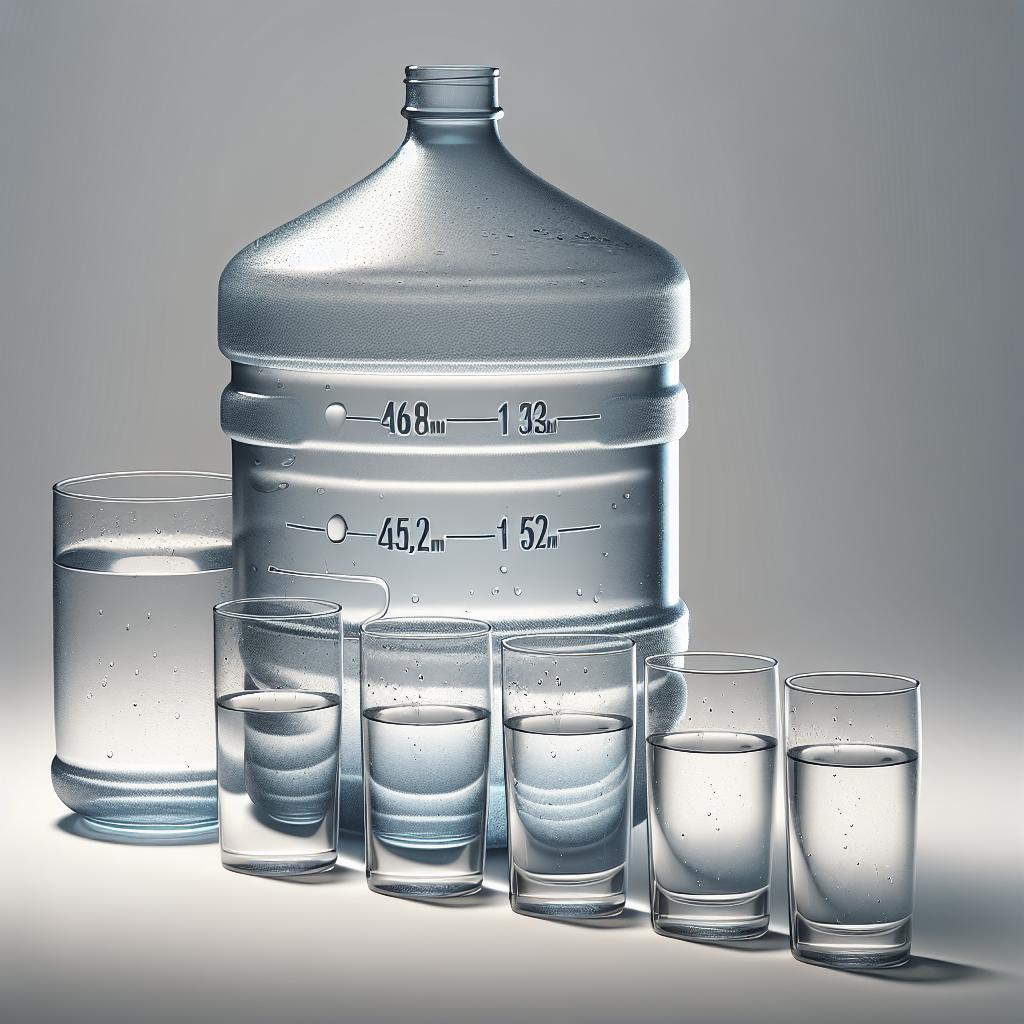“`html
How Many Glasses is 1 Gallon of Water?
Water: it’s the essence of life and a crucial daily necessity for maintaining proper bodily functions. But how much water should you really be drinking each day? In this blog post, we dive into the age-old question of how many glasses make up a gallon of water. We’ll explore daily water intake recommendations, offer a detailed conversion guide from ounces to gallons, and provide tips for drinking a gallon of water per day. Moreover, you’ll learn how to track your hydration and understand the various health benefits and potential side effects of drinking water. Whether you’re aiming to boost your energy levels, improve skin health, or simply want to stay hydrated, this comprehensive guide will provide valuable insights into proper water consumption habits.
We Recommend
Many health experts suggest drinking eight 8-ounce glasses of water per day, commonly referred to as the “8×8 rule.” This recommendation provides an easy guideline to remember but might not be scientifically precise for every individual. Notably, the total number of glasses needed to make one gallon is 16, given that a gallon contains 128 ounces of water.
However, not everyone’s daily needs are the same. Factors such as age, sex, physical activity, and overall health significantly impact one’s water requirements. Consequently, while aiming for eight glasses is a good start, it may not suffice for everyone. Tailoring your hydration strategy to your personal needs is essential for optimal health.
How Much Water Should You Drink a Day?
The amount of water you should drink daily can vary widely. According to the National Academies of Sciences, Engineering, and Medicine, general water intake for men is about 3.7 liters (or 125 ounces) and for women, approximately 2.7 liters (or 91 ounces) daily. This includes all beverages and moisture-rich foods.
Active individuals and athletes often require more water, especially when engaging in strenuous exercise or in hot environments. Additionally, specific life stages and conditions, such as pregnancy, breastfeeding, and illness, may increase water needs. Therefore, understanding your body’s signals for thirst and staying attuned to environmental factors are vital in determining your personal needs.
Conversion Rate for Ounces to Gallons
Understanding the conversion rate between ounces and gallons is critical for accurately tracking your water intake. There are 128 ounces in a U.S. gallon. Therefore, if a typical glass of water is around 8 ounces, you would need 16 glasses of this size to make a full gallon.
For those accustomed to liters, remember that one U.S. gallon equals approximately 3.785 liters. Understanding these basic conversion metrics can greatly assist in setting and reaching your hydration goals, whether you measure in ounces, liters, or glasses.
How to Drink a Gallon of Water a Day
The idea of drinking a gallon of water each day might seem daunting, but it can be more manageable with a strategic approach. Start by spreading your water consumption across the day, rather than attempting to drink it all in one go. Setting a schedule, such as drinking a glass upon waking, another with each meal, and consistently throughout the day, can be helpful.
Using a marked water bottle or mobile apps can also serve as constant reminders and visual guides for your daily progress. Gradually increasing your water intake can help your body adjust without feeling overwhelmed. Remember, the key is consistency rather than forcing large amounts of water at once.
Track How Much Water You’re Drinking
Keeping track of your daily water intake is essential for ensuring you’re meeting your body’s hydration needs. Techniques vary from simple pen and paper to high-tech solutions like smart water bottles that sync with apps on your phone.
Many fitness trackers and health apps offer hydration logs, making it easy to note every glass you drink. Regularly assessing your hydration habits can help identify patterns, like drinking less water during weekends or specific times of the day. By tracking these trends, you can make necessary adjustments to improve your overall hydration.
The Health Benefits of Drinking Water
Drinking adequate amounts of water provides various health benefits, such as improving physical and cognitive performance, supporting digestion, and maintaining energy levels. Water is also crucial in regulating body temperature and transporting nutrients throughout your body.
Furthermore, proper hydration is associated with healthier skin, weight management, and even enhanced mood and focus. By prioritizing water intake, you bolster your immune system and promote overall well-being, making it an essential component of a healthy lifestyle.
Side Effects of Drinking Too Much Water
Although rare, excessive water intake can lead to a condition known as hyponatremia or water intoxication. This occurs when the body’s sodium levels drop too low due to overconsumption of water, leading to potential complications such as nausea, headaches, confusion, and in severe cases, seizures.
To prevent these adverse effects, ensure your water intake is balanced with appropriate sodium levels and listen to your body’s natural cues for thirst and satiety. Remember, moderation is key, and understanding your unique hydration needs will help you maintain a healthy balance.
Summary of Main Points
| Subheading | Main Points |
|---|---|
| We Recommend | Aim for eight 8-ounce glasses per day, but individual needs vary. |
| How Much Water Should You Drink a Day? | Recommended 3.7 liters for men, 2.7 liters for women; influenced by factors like activity and health. |
| Conversion Rate for Ounces to Gallons | 128 ounces in a gallon; 16 standard glasses in a gallon. |
| How to Drink a Gallon of Water a Day | Spread intake; use schedules and tracking tools. |
| Track How Much Water You’re Drinking | Utilize apps and trackers for consistent hydration habits. |
| The Health Benefits of Drinking Water | Improves physical performance, digestion, skin health, and supports overall well-being. |
| Side Effects of Drinking Too Much Water | Risk of hyponatremia; balance intake with sodium levels. |
“`


